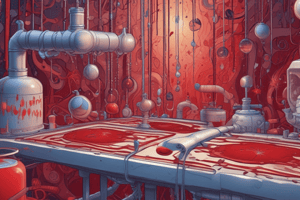Podcast
Questions and Answers
What was the result of blood transfusions from one person to another when they were first attempted?
What was the result of blood transfusions from one person to another when they were first attempted?
- Only agglutination of the red blood cells
- Immediate or delayed agglutination and hemolysis of the red blood cells (correct)
- Only hemolysis of the red blood cells
- No reaction at all
Why do antibodies in the plasma of one blood type react with antigens on the surfaces of the RBCs of another blood type?
Why do antibodies in the plasma of one blood type react with antigens on the surfaces of the RBCs of another blood type?
- Because the blood types of different people have different antigenic and immune properties (correct)
- Because the blood types of different people have different agglutination properties
- Because the blood types of different people have different hemolysis properties
- Because the blood types of different people have different genetic properties
How many commonly occurring antigens have been found on the surfaces of the cell membranes of human blood cells?
How many commonly occurring antigens have been found on the surfaces of the cell membranes of human blood cells?
- At least 20
- At least 50
- At least 10
- At least 30 (correct)
What is the main significance of the antigens found on the surfaces of human blood cells?
What is the main significance of the antigens found on the surfaces of human blood cells?
What two particular types of antigens are much more likely than others to cause blood transfusion reactions?
What two particular types of antigens are much more likely than others to cause blood transfusion reactions?
What are type A and type B antigens also known as?
What are type A and type B antigens also known as?
What is the result of the reaction between type A and type B antigens and their respective antibodies?
What is the result of the reaction between type A and type B antigens and their respective antibodies?
What is the purpose of determining the antigenic and immune properties of the blood types of the donor and recipient?
What is the purpose of determining the antigenic and immune properties of the blood types of the donor and recipient?
What is the blood type when neither A nor B agglutinogen is present?
What is the blood type when neither A nor B agglutinogen is present?
How many alleles are present in the ABO blood group genetic locus?
How many alleles are present in the ABO blood group genetic locus?
What is the effect of the type O allele on the cells?
What is the effect of the type O allele on the cells?
What is the relationship between the A and B alleles?
What is the relationship between the A and B alleles?
How many possible combinations of alleles are there?
How many possible combinations of alleles are there?
What is the blood type of an individual with the genotype OA?
What is the blood type of an individual with the genotype OA?
What determines the ABO blood group?
What determines the ABO blood group?
What is the term for the six possible combinations of alleles?
What is the term for the six possible combinations of alleles?
Study Notes
Antigenicity and Immune Reactions of Blood
- Early blood transfusions often led to immediate or delayed agglutination and hemolysis of red blood cells (RBCs), resulting in typical transfusion reactions that frequently led to death.
- The blood types of different people have different antigenic and immune properties, with antibodies in one blood type reacting with antigens on the surfaces of RBCs of another blood type.
Multiplicity of Antigens in Blood Cells
- At least 30 commonly occurring antigens and hundreds of rare antigens have been found on the surfaces of human blood cell membranes.
- Most antigens are weak and important for studying the inheritance of genes to establish parentage.
- Two main types of antigens that cause blood transfusion reactions are the O-A-B system and the Rh system.
O-A-B Blood Types
- Type A and type B antigens (agglutinogens) occur on the surfaces of RBCs in a large proportion of people.
- These agglutinogens cause most blood transfusion reactions.
- People can have neither A nor B agglutinogens, one, or both simultaneously due to inheritance.
Classification of O-A-B Blood Types
- Blood is classified into four major O-A-B blood types: O, A, B, and AB.
- Type O blood has neither A nor B agglutinogens.
- Type A blood has only type A agglutinogen.
- Type B blood has only type B agglutinogen.
- Type AB blood has both A and B agglutinogens.
Genetic Determination of Agglutinogens
- The ABO blood group genetic locus has three alleles: IA, IB, and IO.
- These alleles determine the three blood types: A, B, and O.
- The type O allele is functionless or almost functionless, while the type A and type B alleles cause strong agglutinogens on the cells.
- The O allele is recessive to both the A and B alleles, which show co-dominance.
Genotypes and Blood Types
- Each person has two sets of chromosomes, with one of the three alleles present on each chromosome.
- There are six possible combinations of alleles: OO, OA, OB, AA, BB, and AB.
- These combinations of alleles are known as the genotypes.
- Each genotype corresponds to a specific blood type:
- OO: O
- OA or AA: A
- OB or BB: B
- AB: AB
Studying That Suits You
Use AI to generate personalized quizzes and flashcards to suit your learning preferences.
Description
Learn about the antigenicity of blood and its role in causing immune reactions, including agglutination and hemolysis of red blood cells during blood transfusions.




